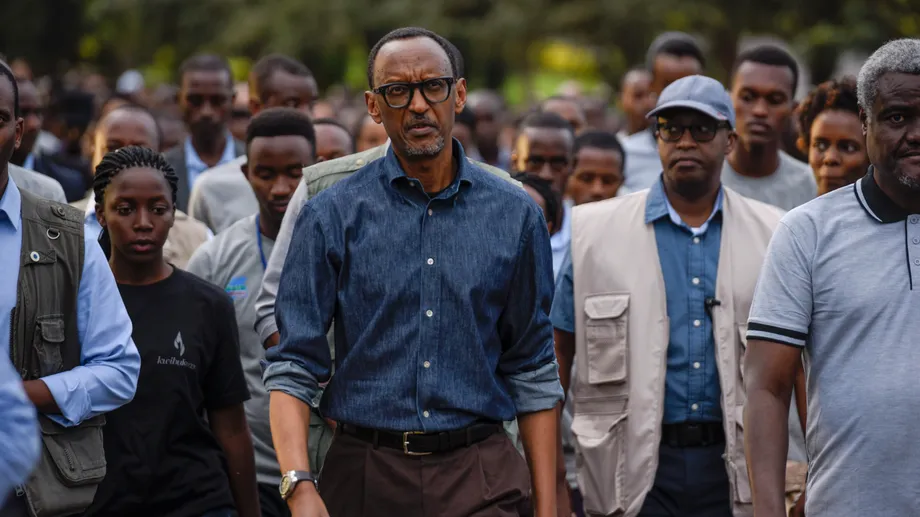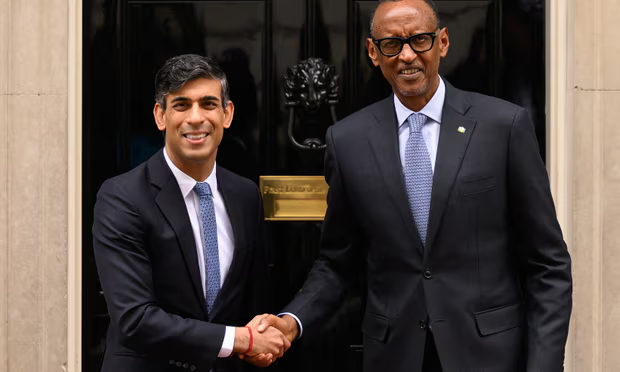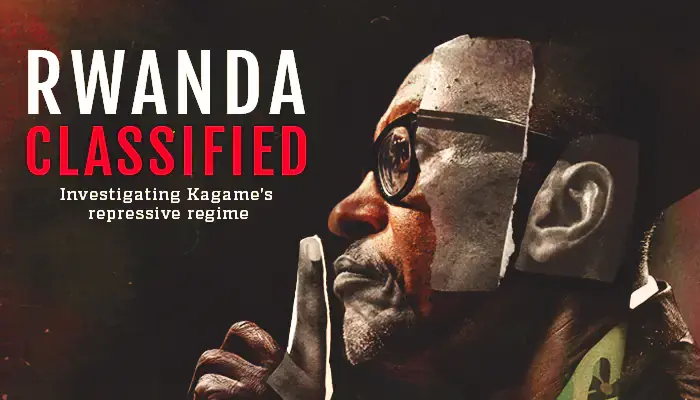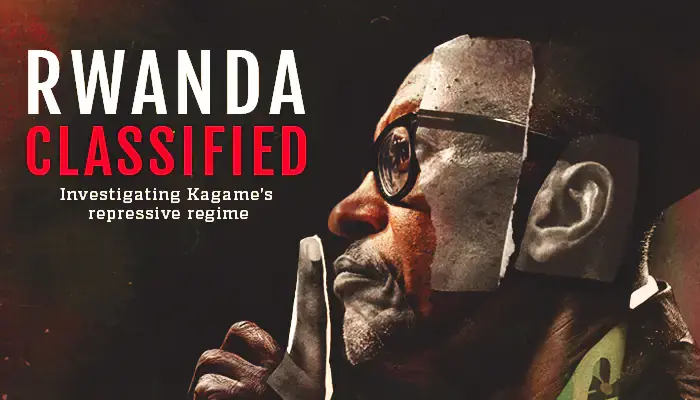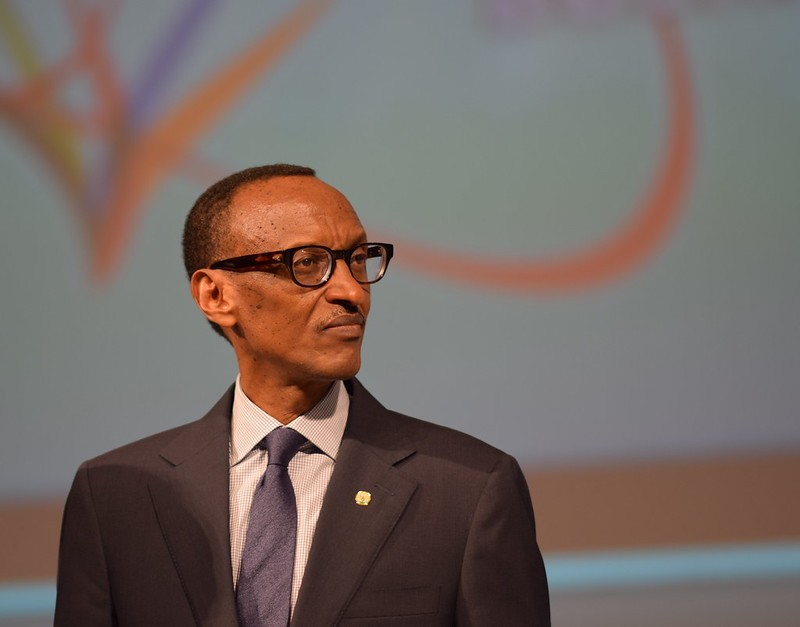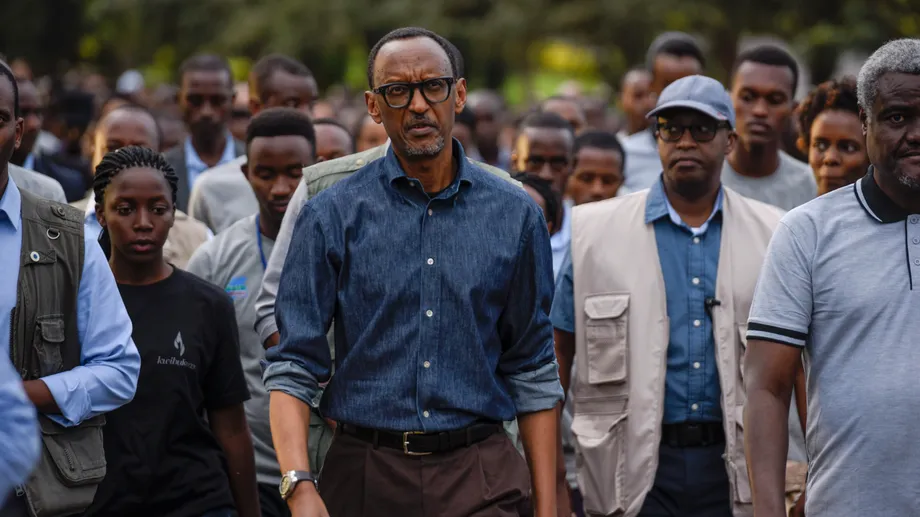
German parliamentarian Jens Spahn takes a close look at the beds. Two small pillows have been neatly placed at the heads, the sheets are bright white, and a brown decorative ribbon is draped across the covers. Spahn, of the center-right Christian Democratic Union (CDU), seems satisfied. The tour then continues to the sickbay, which is equipped with a bed, and to the computer room with its desktop devices. Everything is in perfect shape.
A number of journalists, politicians and other emissaries have already been led through the Hope Hostel in Kigali, and now it is the turn of Jens Spahn. This is where migrants from Great Britain are to be housed in the future. The idea is that instead of being granted asylum in Great Britain, migrants will be sent straight to Rwanda – in order to deter others from making the trip. It is a plan that has triggered intense international criticism and was briefly suspended by the courts. Nevertheless, Spahn would like to see the EU make a similar deal. The prospects are good, Spahn says in Kigali.
But the highlight of Spahn’s trip only comes after his visit to Hope Hostel – when he meets with Rwandan President Paul Kagame. In greeting, a grinning Spahn hands him the diplomatic gift he brought along, the official football of the European Championships. The two of them already know each other, having met during Spahn’s tenure as German health minister, and they have good chemistry. Beyond that, the visit is a win-win situation: Jens Spahn once again finds himself in the spotlight and his host Kagame can pose as a problem solver on equal footing.
Jens Spahn traveled to the Rwandan-Congolese border in 2019 when he was German health minister. Foto: Xander Heinl / photothek / picture alliance
Rwanda, though, is an autocratic country. Government opponents are harassed and persecuted, with quite a few of them disappearing without a trace or losing their lives in dubious circumstances, both at home and abroad. The regime has spies everywhere that report suspicious behavior. Elections are neither free nor fair.
Seventeen international media outlets, including DER SPIEGEL, German public broadcaster ZDF and the Austrian daily Der Standard have spent recent months looking into human rights violations and acts of repression committed by the Rwandan regime. The joint investigative project was coordinated by the non-profit journalism association Forbidden Stories under the name Rwanda Classified. As reporting has revealed, the long arm of the Rwandan regime even reaches as far as Germany.
There are two primary narratives that can be applied to Rwanda, the small, East African country of 14 million. The first focuses on how the country managed to rise up from the horrors of its past – of how it emerged from the brutal 1994 genocide just 30 years ago to become a country striding into modernity with a growing economy and a capital city that looks at times not unlike a European metropolis. A model country that can be a worthy partner for international treaties. That is the story that Western politicians prefer to hear.
But there is a different narrative. It focuses on critics who have been silenced, on political assassinations at home and abroad. It includes the fact that Rwandan media outlets have become mouthpieces of the dictatorship. And the fact that critical journalists have disappeared – like John Williams Ntwali.
A European style pedestrian zone in the heart of the capital Kigali. Foto: Guillem Sartorio / DER SPIEGEL
BionTech is one of Rwanda’s recent investors, having built a vaccine production facility in Kigali. BionTech co-founder Uğur Şahin joined Paul Kagame when construction started in 2022. Foto: Simon Wohlfahrt / DER SPIEGEL
An investigative journalist, Ntwali was one of the few who still dared to uncover injustices in the country. Ntwali reported on expropriations in a giant slum in Kigali, for example, in addition to writing about numerous trials against opposition activists and the arrests of journalists. He has long been concerned about becoming a target himself. Witnesses interviewed by the media partners of Rwanda Classified recall that prior to his death, Ntwali told them he was being followed and that the regime wanted to kill him. According to one source, Ntwali said that he had even received a concrete warning from the secret services: “We’re going to run you over when you’re on your motorcycle.” A short time later, as the official version would have it, the journalist was killed in a traffic accident while on a motorcycle taxi.
But there are significant doubts as to whether it really was merely a tragic accident. Friends and supporters believe that it may have been a targeted attack, as do human rights organizations. “We think there is strong evidence for allegations that he was killed,” says Lewis Mudge, the director for Central Africa with the non-governmental organization Human Rights Watch, which looks into possible human rights violations. The Rwandan government did not respond to a query from DER SPIEGEL.
The death of John Williams Ntwali was the starting point of the Rwanda Classified reporting project. Dozens of journalists conducted reporting on the ground in Rwanda and they interviewed security officials, regime opponents and insiders – including sources in Germany.
It’s a Saturday evening in May and a choir has gathered in the Franciscan Church in Dortmund. Women and men, some of them wearing blue robes, are singing songs by the Rwandan singer Kizito Mihigo, who also died in mysterious circumstances. According to the government, he hanged himself inside a police station in Kigali. But there are many who have their doubts about that version of events. Mihigo had been arrested because some of his gospel songs are critical of the government.
None of those in this Dortmund choir made up of Rwandans in exile believe the suicide story. In Germany, they are allowed to sing Mihigo’s songs, which is impossible back home, but the choir members are still extremely cautious. They hardly trust anybody, their own compatriots least of all.
Alice Munyarubuga is the star guest of the evening. She knew Mihigo personally. When he died in February 2020, she recorded a song in his memory and published it on YouTube. The problems began a short time later. Munyarubuga needed a new passport, but suddenly she was unable to get an appointment to pick it up in the Rwandan Embassy in Berlin, she says. As confirmed by chat protocols obtained by DER SPIEGEL, she even contacted the first secretary at the embassy. Instead of a reply, the secretary sent a link to Munyarubuga’s YouTube video, with no additional message. If you don’t play along, you will be punished was the not-so-subtle message.
A Rwandan choir in Dortmund. Foto: Sophia Baumann
The Rwandan Embassy in Berlin could not be reached for comment, nor could the former first secretary.
Other Rwandans in German exile have also reported experiencing harassment. Some say they have received threatening phone calls from anonymous numbers. “Sometimes they didn’t say anything at all, for 10 to 15 seconds,” says Emmanuel Ndahayo, who used to work for a Rwandan opposition party. Or they would say: “We know where you are.” Many say they are afraid of possible consequences for their families and friends back home. It’s not uncommon for family members of critics to disappear without a trace or to receive threats.
German authorities know little about the activities of Rwandan secret services in Germany, despite the fact that experts from the human rights organization Freedom House rank Rwanda among the 10 worst countries when it comes to cross-border repression. The Belgians – who used to hold Rwanda as a colony and are now home to numerous Rwandans in exile who are critical of the regime – are a bit further along. The Belgian military intelligence agency SGRS confirms “clandestine activities” by Rwanda on Belgian territory. According to Belgian security sources, such clandestine activities include “actions against the Rwandan diaspora,” ranging from active surveillance to acts of violence, which are described as “unacceptable.” In Sweden, meanwhile, Rwandan diplomats have even been kicked out of the country for spying on those who fled the home country.
Officials and diplomats from several EU countries regularly express criticism of the Rwandan government and openly speak of human rights violations. The Germans, by contrast, prefer restraint and have shown a preference for positive news from Kigali, says one European diplomat. And there is a fair amount of that. BionTech has just opened a vaccine factory in Rwanda, for example, with German Foreign Minister Annalena Baerbock traveling to the country for the occasion. Not far from the BionTech location, VW operates a car assembly plant and also runs a taxi app in the city. Its cars can be seen everywhere. The head of VW Mobility in Kigali used to work for the Rwandan government, and his profile on X still includes the hashtag #TeamPK, which is used by supporters of Paul Kagame.
Rwanda’s long-time ruler Paul Kagame. Foto:
Jean Bizimana / REUTERS
An additional piece of good news was announced in August 2023. Rwanda’s leader Kagame held up an FC Bayern Munich jersey – covered in autographs – for the cameras, a top club functionary standing next to him. Rwanda had become one of the club’s “platinum partners,” paying millions per year to FC Bayern for the privilege. A small African country that depends heavily on development aid had suddenly become a major sponsor of the wealthiest football club in Germany. Since then, stadium ads at FC Bayern home games have read: “VISIT RWANDA.”
The deal is a major success for Paul Kagame – a further step toward the normalization of his regime. FC Bayern CEO Jan-Christian Dreesen defended the team’s decision at the time and insisted that team leadership had “taken a close look at Rwanda” prior to signing the sponsorship deal. When contacted by DER SPIEGEL, FC Bayern says today that the team relied on evaluations from the European Union, German ministries and the German Embassy in Kigali.
Reporting by DER SPIEGEL and its media partners indicate that the deal was more likely the product of targeted influence, driven by an ambitious exiled Rwandan named Chantal Mukashyaka. Several people familiar with the deal say that she was the one who laid the foundations for the sponsorship deal. In a group photo showing Kagame together with team representatives, Mukashyaka is standing in the first row.
Standing between Mukashyaka and Kugame is a smiling Stefan Schaffelhuber, a sports entrepreneur. He and Mukashyaka, who was born in Rwanda, were a couple for at least a short time, as evidenced by earlier photos from Munich high society gatherings. The two were also, and perhaps still are, partners in Schaffelhuber Consulting GmbH. According to the commercial register, she holds a 20-percent stake in the company. An insider says that the two of them engineered the deal between the Rwandan tourism agency and FC Bayern. The Munich football powerhouse has declined to discuss the deal. Schaffelhuber and Mukashyaka could not be reached for comment.
The episode shows how Rwanda is using pro-regime elements in the diaspora to exert influence and boost its image abroad. Organizations loyal to the government regularly also hold Rwanda Day, on which Rwandans living in exile gather to celebrate their homeland. Such an event took place in Germany in 2019. During Rwanda Day, regime opponents are routinely intimidated, according to interviews conducted with victims of such bullying by Human Rights Watch.
Sometimes, though, the Rwandan regime doesn’t need a clandestine network. It can instead rely on official assistance from the West. The EU, for example, is currently planning to supply money to support the Rwandan government’s marketing activities. Evidence is provided by two tenders issued by the European Union. One of the tenders explicitly refers to “Nation Branding,” noting that the country’s economic progress is to be better communicated to the outside world. The tender is designed to attract companies that can develop such a marketing strategy. In other words, EU money is to be used for the purpose of improving Rwanda’s image, funded out of the European Development Fund. According to the EU, the 848,000-euro contract has not yet been awarded.
In the publicly available documents, there is no mention of human rights violations and suppression of the opposition. Rwanda’s positive public image appears to be more important. When reached for comment, the office responsible within the European Commission said the tender is designed to support the tourism sector, which promotes economic growth and job creation.
CDU politician Jens Spahn also appears to be pleased with his visit to Rwanda. Of course it is also necessary to speak with the government about critical aspects, he says in an interview during his trip. “But when we only accept countries as partners that are like Germany, then we won’t find too many partners in the world for migration deals.” In other words, it’s better to close an eye to human rights violations as long as the refugee problem is solved. It is likely music to the ears of Rwanda’s autocrat, Paul Kagame.

